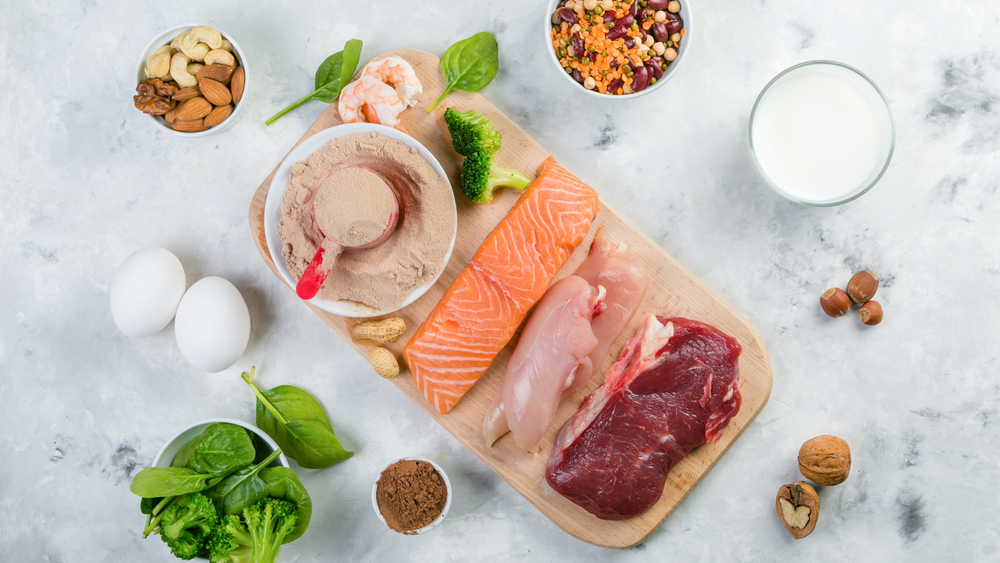Protéines : pourquoi vous en avez besoin (et où les trouver)

En ce qui concerne notre composition, la réponse est : beaucoup de choses. Mais globalement, notre corps est constitué de protéines. En fait, les protéines représentent 15 à 20 % de notre poids corporel et, après l’eau, sont la deuxième substance la plus abondante du corps – et elles sont essentielles au bon fonctionnement de tout notre organisme.
Que vous préfériez une protéine végétalienne (qui doit être entièrement fermentée, multi-sources et sans sucre) ou un isolat de protéines de lactosérum 100 % nourri à l'herbe, les shakes protéinés sont un excellent moyen, faible en calories, d'augmenter votre apport en protéines, afin que vous puissiez non seulement ressentir cette sensation de satiété, mais aussi incliner votre corps vers un équilibre azoté positif, pour aider à développer et à maintenir la masse maigre à mesure que vous vieillissez.
Sources :
[1] Binosha Fermando, Rainey-Smith Stephanie R. Associations entre l'apport en protéines et en fibres alimentaires et la concentration de bêta-amyloïde dans le cerveau et le sang. Journal of Alzheimer's Disease, vol. 61, n° 4, pp. 1589-1598, 2018
- Les enzymes, la peau, les cheveux, les ongles, les os et le tissu conjonctif sont tous constitués de protéines.
- Nos neurotransmetteurs, les messagers chimiques que nos cellules cérébrales utilisent pour communiquer (et servent ainsi de base à toute pensée) sont constitués de précurseurs protéiques.
- Parce qu'elles sont si précieuses pour le corps humain, nos besoins en protéines peuvent même déclencher notre faim, nous incitant à manger davantage lorsqu'elles viennent à manquer. C'est pourquoi ajouter plus de protéines à notre alimentation peut nous aider à nous sentir plus rassasiés.
- Les protéines font pencher la balance en azote dans notre corps, un facteur clé dans la croissance et le maintien de la masse maigre à mesure que nous vieillissons.
- Les protéines pourraient même préserver notre cerveau. Une étude a montré que l'apport alimentaire en protéines était significativement associé à une réduction du risque de présence de plaques amyloïdes importantes dans le cerveau des personnes âgées. [1]
Je mange de la viande et je parle souvent des bienfaits des aliments d'origine animale, riches en protéines et pauvres en glucides. Je suis convaincu que leur consommation régulière est bénéfique pour la santé à bien des égards. D'autant plus qu'une glycémie élevée de façon chronique peut avoir de nombreux effets indésirables à long terme. (Vous trouverez plus d'informations sur ma philosophie dans mon livre Genius Foods.)
J'ai compilé ici quelques excellentes sources de protéines et d'autres nutriments que vous pourriez trouver dans ces aliments. C'est parti !
Œufs
Un œuf contient environ 78 calories et 6,3 grammes de protéines. De plus, un seul œuf contient 25 % de l'apport nutritionnel recommandé (ANR) en choline, un composé vitaminique conditionnellement essentiel au bon fonctionnement des cellules cérébrales.Turquie
100 grammes (ou 2,5 onces) de dinde contiennent 30 grammes de protéines. La dinde est également une excellente source d'iode, fournissant 23 % des AJR par portion ! L'iode est si important pour la production d'hormones thyroïdiennes que le sel de table doit désormais en être enrichi, sous peine d'être signalé par un avertissement. Mais qui a besoin d'aliments transformés enrichis quand on peut trouver ses nutriments naturellement dans des aliments complets ?Crevette
100 grammes de crevettes contiennent 21 grammes de protéines. En plus d'être délicieuses et polyvalentes, elles vous apportent plus de la moitié des apports journaliers recommandés en sélénium. Le sélénium, comme l'iode, est essentiel au bon fonctionnement de la thyroïde et constitue un puissant antioxydant pour le cerveau.Bœuf nourri à l'herbe
La même portion de 3,5 onces (100 grammes) de bœuf nourri à l’herbe fournit 23 grammes de protéines, ainsi qu’une multitude de micronutriments comme le zinc, la choline, la niacine et le fer.Saumon sauvage
En plus de contenir 25 grammes de protéines par portion, le saumon sauvage est riche en DHA, un acide gras qui favorise la croissance de nouvelles cellules cérébrales saines. Les acides gras oméga-3 (dont le DHA fait partie) ont également un effet bénéfique sur la flore intestinale, ce qui prouve que les aliments sains peuvent améliorer la santé par de multiples voies.Poudre de protéines
Une cuillère de 30 grammes de poudre de protéines contient généralement environ 100 calories et vous fournit 20 à 25 grammes de protéines faciles à incorporer.Que vous préfériez une protéine végétalienne (qui doit être entièrement fermentée, multi-sources et sans sucre) ou un isolat de protéines de lactosérum 100 % nourri à l'herbe, les shakes protéinés sont un excellent moyen, faible en calories, d'augmenter votre apport en protéines, afin que vous puissiez non seulement ressentir cette sensation de satiété, mais aussi incliner votre corps vers un équilibre azoté positif, pour aider à développer et à maintenir la masse maigre à mesure que vous vieillissez.
Sources :
[1] Binosha Fermando, Rainey-Smith Stephanie R. Associations entre l'apport en protéines et en fibres alimentaires et la concentration de bêta-amyloïde dans le cerveau et le sang. Journal of Alzheimer's Disease, vol. 61, n° 4, pp. 1589-1598, 2018

















































